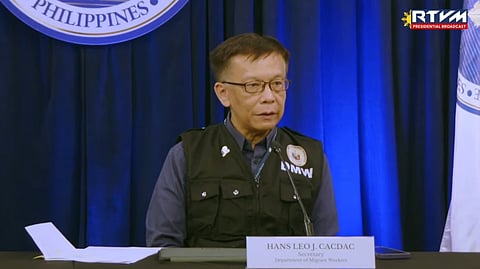
- NEWS
- the EDIT
- COMMENTARY
- BUSINESS
- LIFE
- SHOW
- ACTION
- GLOBAL GOALS
- SNAPS
- DYARYO TIRADA
- MORE

The nature of their work as domestic helpers is seen as a factor for many overseas Filipino workers (OFWs) in Lebanon refusing to evacuate, according to Department of Migrant Workers (DMW) Secretary Hans Cacdac.
In a press briefing on Thursday, Cacdac said that nearly 98 percent of OFWs in Lebanon live with their employers, leading to a deep commitment to their households.
“They might have a sense of loyalty and commitment to serve their employers’ households, that could be one of the reasons,” he said.
Cacdac also noted a similarity with OFWs in Israel, where many work as caregivers and have a comparable sense of duty toward the families they serve.
Despite a significant number of OFWs withdrawing their repatriation applications the previous month, Cacdac said the agency has observed an increase in applications.
“To give you an illustration, the months of September and October account for 30 to 40 percent of total repatriations for the year,” he noted.
To date, 192 OFWs have been booked on commercial flights scheduled to depart between 11 and 28 October. Eleven OFWs are expected to arrive in the Philippines this weekend on three separate flights.
There are 413 repatriation applications awaiting processing by Lebanese immigration authorities. Additionally, approximately 179 workers are currently staying in four shelters around Beirut.
Cacdac assured that the shelters could accommodate more occupants if needed.
One of the main challenges, according to the secretary, is coordinating with Lebanese authorities to expedite the processing of the workers’ documents.
“It’s a two-step process — we receive and process the requests, then endorse them to Lebanese immigration,” he explained.
Lebanon remains under Alert Level 3, which mandates a voluntary repatriation. The Department of Foreign Affairs is currently reviewing whether to elevate this to Alert Level 4, which would mandate the repatriation of all OFWs.
Cacdac said that should the alert level be raised, the government is fully prepared to respond to the situation.
